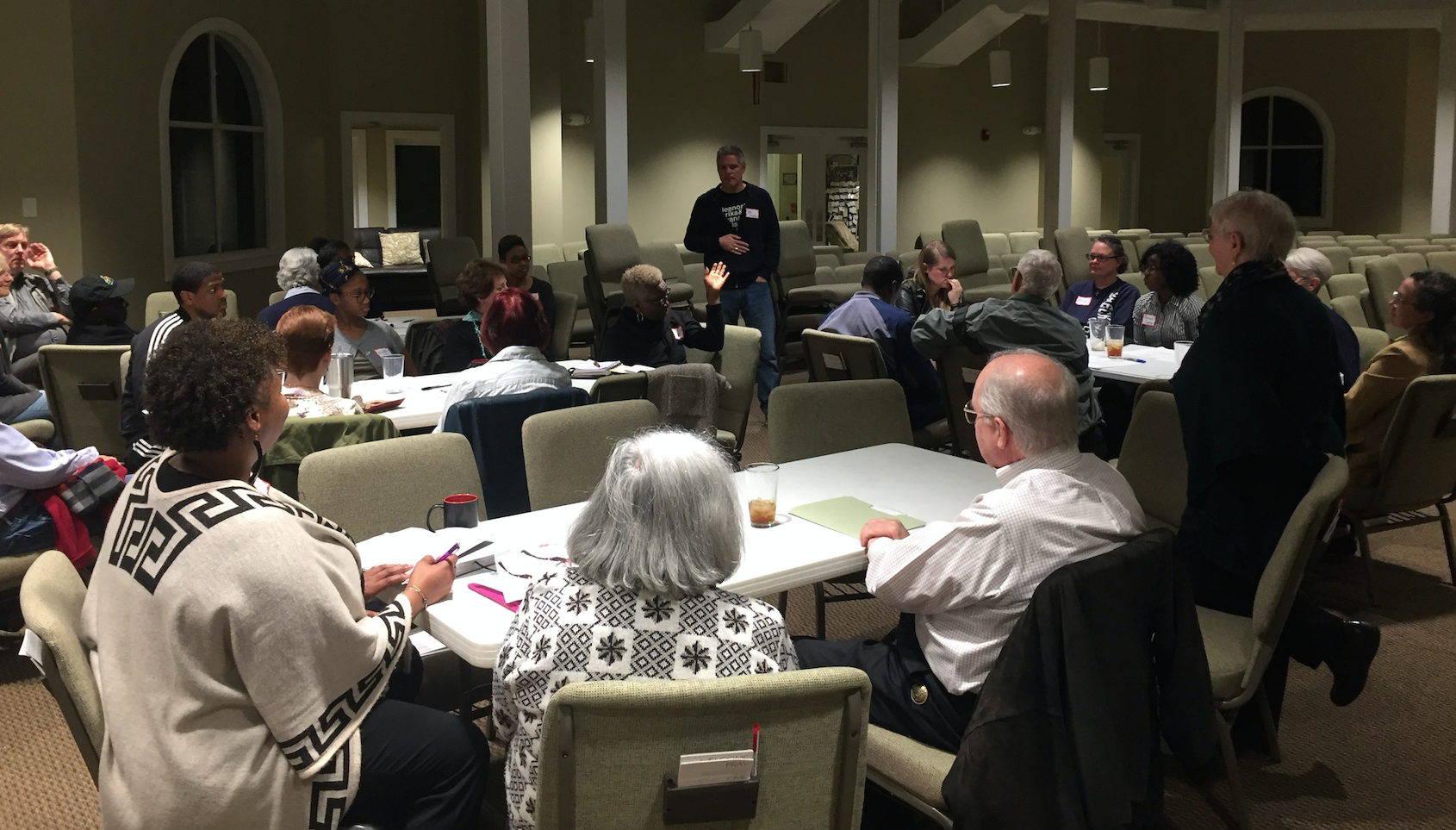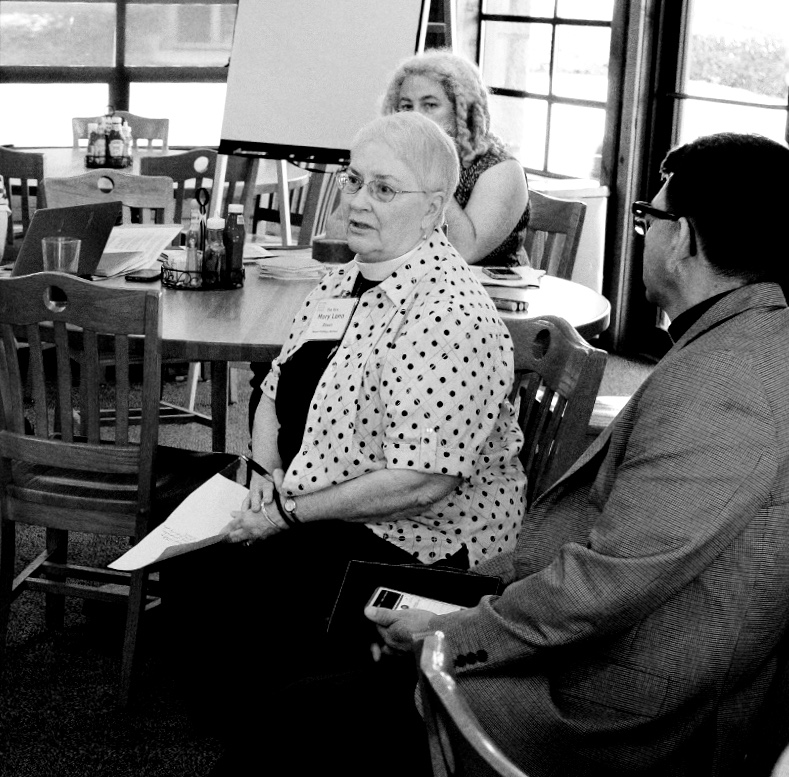
The lasting images and deep divide that followed last year’s white nationalist rally in Charlottesville, VA had only been out of the headlines for a short time. Then, news emerged that “alt right” leader Richard Spencer was making plans to bring a rally to Texas A&M University’s campus. That’s when a group of religious leaders in Bryan-College Station decided they had to take another stand against racism, but in an entirely new way.
”Our original goal was to create a safe place in which people could build relationships that were not inhibited by race,” said The Rev. Mary Lenn Dixon, Deacon for all three Episcopal congregations in Bryan-College Station. “That way, when racial issues developed in our community we would already have cross-race relationships built.”
Dixon had been inspired by stories of racial reconciliation and solidarity work occurring in several congregations across the Episcopal Diocese of Texas. She says she felt personally encouraged to step boldly in her community.
Dixon and Pastor Eleanor Colvin joined forces for the new effort to build racial solidarity in Brazos County. Colvin is pastor of First United Methodist Church, a predominately African-American congregation in College Station.
The interfaith clergy group prioritized conversations on how to keep their communities from becoming fractured and more isolated, and committed to providing a cross-cultural experience for their congregations. Dixon, Colvin, and two other congregational leaders committed to the project that represented two Anglo churches and two African-American churches. They put together a racially-balanced study group of 30 people who agreed to meet for six weeks.
Leaders developed a Bible study as a first-step opportunity to explore deeper relationship across racial boundaries. They focused on what all four congregations had in common: stories from scripture.
“All appreciate the common heritage of the scripture, and additionally, all value being able to sit at the table with folks who perhaps you normally wouldn’t,” Colvin said. “I think the people in my congregation appreciated it as did those in the other churches.”
Each week, the small group shared stories of Creation, Calling, Crisis and Collaboration, with discussion questions to encourage personal storytelling.
“One of the things we found in the beginning, was that people would go to their heads instead of their lives,” said Dixon. “So there would be a lot of opinions, or a lot of Bible study kinds of responses, instead of telling a story. That improved over time. We knew that we were building a safe space when people started telling stories.”
The group was trying to frame personal life stories in the context of the Biblical stories, and that meant most of the group didn’t always talk specifically about race, the Rev. Dixon said.
“Although I don’t think there was a week that there wasn’t some conversation about it,” she said. “Then, at one table there was a story told about growing up in segregated Texas. After listening to the story, one of the white men at the table responded by saying, ‘At least things like that don’t happen anymore.’ An older, very dignified woman from one of the African-American churches just looked at him and said, ‘Oh yes, it still happens.’ That was an ‘a-ha’ moment at that table.”
The planning team was very intentional when it decided where the group would meet from week to week. The decision was made to select two centrally-located spaces.
“It matters whether you go to my house or I go to yours, so we traded off between one white and one African-American church each week,” Dixon said.
Now that the initial six-week group Bible study is complete, the group will continue to focus on relationship building. They recently met in a local restaurant for what they called the Story and Supper Club.
“It really speaks to the beginning of the early church where you would share lives around a table. That’s how community was built,” said Colvin. “That’s where you learned scripture. That’s where you learned to be a people of faith: at the round table with your brothers and sisters. One hope is for continued relationships through activities like the Story and Supper Club.”
The team now plans to start a new study group in the Fall — using facilitators who were members of this first group. The new facilitators will go to training sessions and additional churches from all corners of the cities will be invited to participate.
Centered on their common story, the ecumenical leaders of this pilot effort share one big hope for their community.
“It’s still important for us to empathize, to build relationships so we get to know one another across racial lines, so we see actual people,” Colvin said. “The more we know another and each other’s stories, the more I think we can embrace one another along the journey, as opposed to taking a defensive posture of fear or aggression.”

“We feel a little bit better about our world when we have friends that we otherwise wouldn’t have known where and how to meet,” said Dixon. “I think it’s a huge issue in race, that in our communities we don’t have a lot of natural meeting places, we’re so segregated. Our purpose and therefore our hope, is that in this time of fractured communities we start building bridges. That when fractures occur in the future, when divisive events happen either locally or nationally, we aren’t on different sides of the river. So that we are all able to reach out to each other, and when we say, ‘What are we going to do about this?’ We’ve already built the trust, and we already have an answer for that question, together.”
Dixon serves on the EHF’s Congregational Engagement Kitchen Cabinet: a team comprised of lay and clergy leaders from across the diocese serving as thought partners and co-creators of working groups to improve community health. She is a regular contributor to EHF’s Racial Reconciliation work.
EHF Congregational Engagement’s goal for racial reconciliation is to assist congregations in developing racial reconciliation initiatives; partnering in community conversations to build trust, inclusion and creating a network for increased solidarity and responsiveness to crisis events and actions to address structural racism.
EHF, EDOT Intercultural Ministry and Provence VII Anti-Racism Network are unified in our Becoming Beloved Community work of The Episcopal Church.
If you would like more information on how to connect to the racial reconciliation work in your area, contact Eric Moen at emoen@episcopalhealth.org 832.807.2582